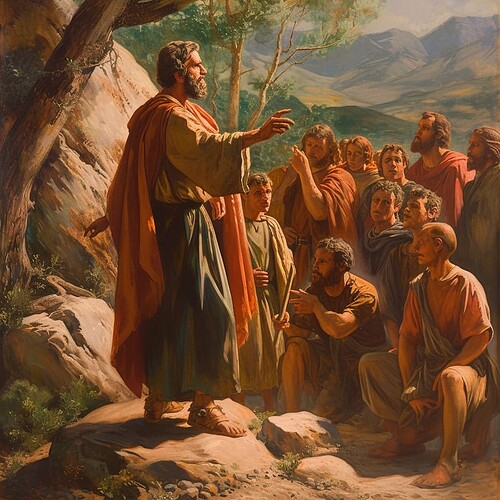![]() February 26: 1 Corinthians 10 - Lessons from History
February 26: 1 Corinthians 10 - Lessons from History
Introduction
![]() The 10th chapter of 1 Corinthians beckons a cautionary tale from the apostle Paul, reaffirming the importance of taking heed from past downfalls, embracing discipline, and the significance of conscious living in our spiritual journey.
The 10th chapter of 1 Corinthians beckons a cautionary tale from the apostle Paul, reaffirming the importance of taking heed from past downfalls, embracing discipline, and the significance of conscious living in our spiritual journey.
 Key Verses
Key Verses
“I strike a blow to my body and make it my slave. I fear that after I have preached to others, I myself might not be disqualified for the prize” (1 Corinthians 10:27)
 Paul Warns of Israel’s Errors
Paul Warns of Israel’s Errors
In this chapter, Paul uses the history of the Israelites as a living example. Their provocative behavior led them astray, and in the midst of divine miracles, they fell into sin and eventually perished. This history lesson is a clear message to us to remain aware, conscientious, and disciplined, lest we, too, fall.
![]() Key Themes and Reflections
Key Themes and Reflections
-
Learning from the past: Paul emphasizes the importance of learning from history and not giving in to temptations that can lead us astray. The past can guide our present actions.
-
Connection with God: The symbolism of the “spiritual food and drink” in this chapter highlights the spiritual connection we need to maintain with God, through Christ, our ‘rock’.
![]() Hidden Gem
Hidden Gem
It’s interesting to note the way Paul uses the history of the Israelites to draw parallels with the struggles of the Corinthians. He emphasizes the importance of vigilance and discipline in maintaining a strong connection with God.
![]() Today’s Application
Today’s Application
This chapter calls us to constantly scrutinize our spiritual journey, reinforcing the need for self-awareness, self-control, and active avoidance of temptations that deviate us from God’s path.
![]() Reflective Q&A:
Reflective Q&A:
![]() Can we stumble even amidst spiritual abundance?
Can we stumble even amidst spiritual abundance?
A: Yes, the Israelites had the spiritual sustenance from God, yet they fell into idolatry. Hence, spiritual abundance is not an insulation against temptation.
![]() What do “spiritual food and drink” represent in this chapter?
What do “spiritual food and drink” represent in this chapter?
A: They symbolize our spiritual connection with God, they nourish our spiritual life just as food and drink sustain us physically.
![]() What does Paul mean by making his body his slave?
What does Paul mean by making his body his slave?
A: By this, Paul means exercising strict discipline over his desires and temptations in order to focus on preaching the gospel.
![]() Join the Discussion
Join the Discussion
Share your insights from today’s reading and how you relate to the themes Paul presents in this chapter. We would love to hear your thoughts!
![]() See You Tomorrow in ‘1 Corinthians 11’
See You Tomorrow in ‘1 Corinthians 11’
Witness the depth of devotion and sacrifice that reflects the spirit of Christ’s love for his followers. Until then, remain spiritually aware, disciplined, and gratified by the love of God.
